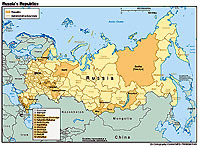A Long Painful Death: Why Russia Is A Bad Place to be Terminally Ill

Natalia Antonova is the deputy editor of The Moscow News.
(RIA Novosti – Natalia Antonova – October 8, 2012) When the tragic details of the final days of Russian bard Ada Yakusheva emerged on Facebook I was stunned.
I had heard that Yakusheva was battling cancer, but what I hadn’t realized is that her doctors had denied her pain medication, on the basis of some bureaucratic error. When her relatives confronted them about her suffering, they were curtly told, “everyone suffers.”
Only her final day alive was Yakusheva allowed some dignity and peace. A hospice doctor had her transferred to a palliative care facility. She was given a shot of morphine, curled up, and slept for what was probably the first time in a month. The following morning, Yakusheva passed away peacefully.
I found out about this through the Facebook page of noted critic and TV presenter Irina Petrovskaya. Irina, who was a close friend of Yakusheva and practically considered her family, cursed the doctors who had made the old woman suffer so much.
Her post soon went viral. Practically everyone saw it even trolls who tried to attack Irina for her “liberalism” (liberalism? Really? An elderly lady, an admired and respected artist, was left to die in agony and their first concern is liberalism?). It was shared hundreds of times over. And in the comments, people related their own stories of despairing over dying relatives who were not allowed to depart this earth with any kind of dignity.
Narcotics legislation is murky and convoluted in Russia. The authorities have pulled out all the stops in their attempt to fight high addiction rates. And yet the bureaucratic hassles that are routinely associated with trying to get dying patients decent care are unconscionable.
Animals are treated no better, with veterinarians subject to such stringent rules regarding pain medication that most simply don’t offer adequate care for pets and other animals in need of invasive treatments such as surgery.
The other issue here is, of course, the attitude of the actual doctors. Most are simply not trained to make their patients comfortable. Once it is clear that the patient is dying a lot of them simply stop caring. And even though palliative care is certainly a major aspect of healthcare in modern Russia, many doctors still resist any urge to call a colleague who works in that field, if only because they don’t want anyone taking over their case.
Yakusheva’s doctors went as far as accuse her relatives of trying to use the dying woman’s condition to score drugs for themselves. The fact that this happened to a well-known personality speaks to the enormity of the problem.
There was no way that these fine, caring individuals were unaware that the details of her suffering and their response to it or lack thereof would be made public. They knew. They just did not care all that much convinced that their colleagues would stand in solidarity with them and that their jobs would not be in any danger.
But what about their professional reputation, you might ask? Well, as Konstantin von Eggert once told me, the whole notion of a reputation has yet to take hold among many Russian professionals. We were talking about politicians at the time, but the same can easily apply to doctors.
Sometimes, I think that doctors wield even more power than politicians at the very least, their authority is more immediate. “It’s because doctors deal with death,” my colleague Anna Arutunyan once said. And Russians don’t shy away from death they deal with it head on, and have much more respect for the people who often act as death’s watchmen.
I suppose this is why the whole culture of “let’s get a second opinion” is not very big in Russia although perhaps I’m overanalyzing it. Perhaps it’s really an issue of long lines and rudeness at your local hospital and the suspicion that the professionals at the hospital next door may be just as rude.
For whatever it’s worth, Ada Yakusheva is now at peace. It’s her grieving relatives I worry for now. And the sick and dying who will come after her.
